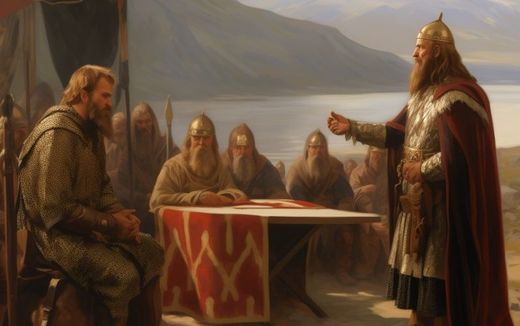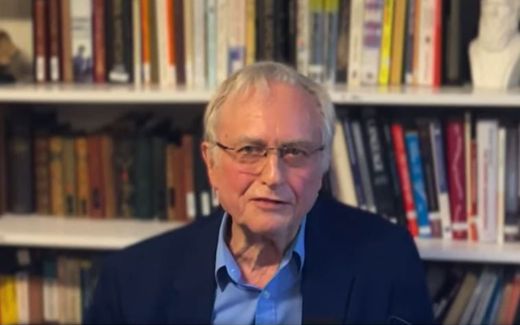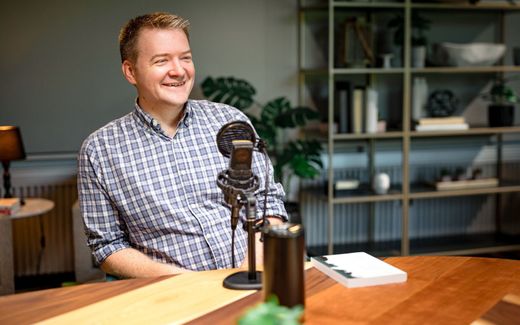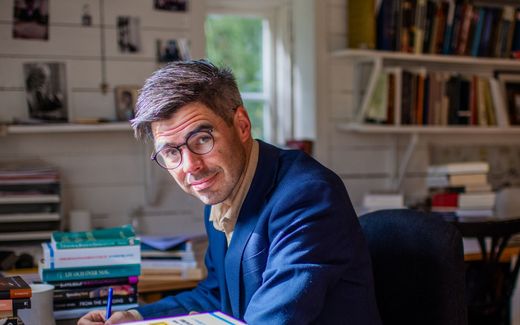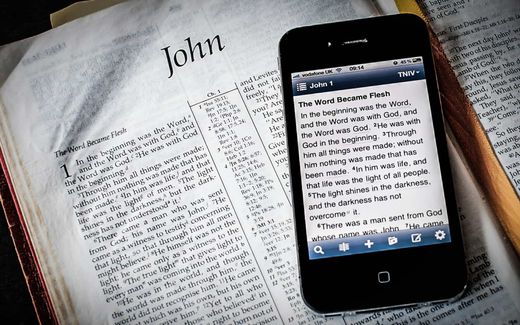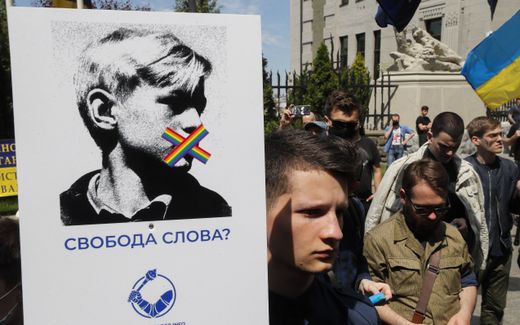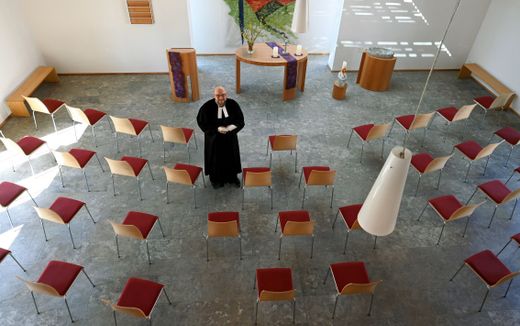Enough Christian history to give Europe a future, author Hendrie van Maanen says
22-05-2024
European Union
Maarten Stolk, RD
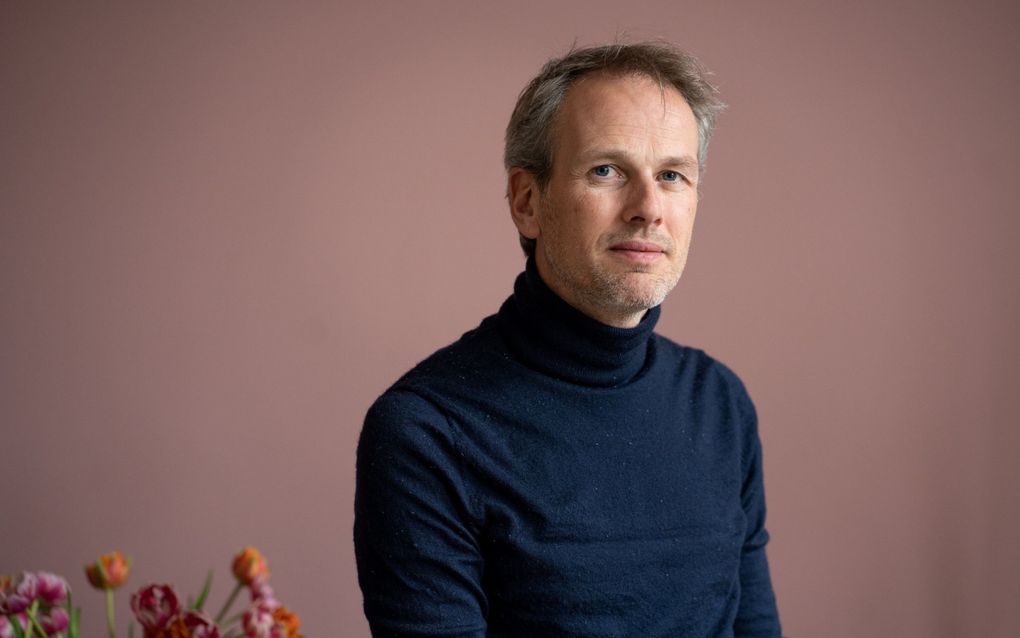
Hendrie van Maanen. Photo Niek Stam
European Union
Europe is unthinkable without Christianity. Yet it is not self-evident that people continue to draw on this source, says theologian Hendrie van Maanen. Are there cracks in the fishbowl in which we in the West swim like goldfish?
During lectures at the Free Academy, intended for "over-60s with a museum pass" and others interested in culture and philosophy, Van Maanen discovered that there is less and less knowledge of the origins of Christianity and its influence on European culture. "While there is a need for that," says the lecturer in European culture and religion at the Christian University for applied science in Ede (CHE), in the living room of his house.
Van Maanen, a member of the Lutheran congregation in his hometown, collected the stories of European church history in the book "Europa en de Weg" (Europe and the Way).
Why do you think it is necessary to draw attention to Europe's Christian roots?
"The history of Christianity –referred to as the Way in the Early Church– possesses an enormous wealth. Something of it I like to pass on to others, also because I find it very interesting myself. I also notice very strongly that there is a lot of illiteracy in this area. Knowledge of religion and theology is minimal in the West.
This will only become more so. In the Netherlands, the number of baptisms in Roman Catholic and Protestant churches has more than halved over the past 20 years. This means that fewer and fewer people are passing on the Christian faith to their children, losing sight of the significance of Christianity to European culture.
I hope that people who read my book will see that Christianity has brought us much, although, of course, some things have gone wrong in history. We owe the fundamental values of our society, such as human dignity and solidarity, to the Christian faith."
That Europe became Christian in the fourth century within a few decades, you call "one of the most remarkable turns in history". How do you explain that turnaround?
"It is really quite extraordinary what happened then. If you want to explain it spiritually, it was the Spirit of God at work.
Historically, under Roman emperor Diocletian, Christians were still fiercely persecuted. They constituted 10 per cent of the population at most. Christianity was illegal and did not count. After the conversion of Emperor Constantine in 312, everything changed: churches were built everywhere, and Christianity gained a privileged position. It even became a state religion by the end of the century. There must have been much underlying goodwill for Christianity.
How do I explain that? The Christian perception of religion, which I find most remarkable, was totally different from that of classical antiquity. In the Christian tradition, the doctrine is fundamental: the Saviour has come to redeem. You don't have to make sacrifices or perform rituals before a god is pleased with you. The view of man is also very different from that of the Romans: the weak and the humble inherit the kingdom. With that, fundamental values are reversed within two or three generations.
Probably, the universal charity of Christianity played a big role in converting people: the community meals, looking after the widow who did not count, and having an eye for the weak in society. You didn't have to have a high position to count."
At the same time, Christians did not always agree among themselves either. A medieval image shows St Nicholas, at the Council of Nicea in 325, slapping the face of the priest Arius, who denied the Trinity.
"We know that early Christianity was certainly not a unity. There were great disputes about the Trinity and the divinity of Christ. Councils were supposed to bring peace and unity. Emperor Constantine did not need all sorts of factions and possible conflicts within Christianity; he wanted unity in his empire. That emotions subsequently ran high, and people sometimes literally grabbed each other by the throat, is something we can no longer easily imagine today. But the stakes were high: religion in society.
Incidentally, the role of Arius, who was condemned by the Council of Nicea, was not over. He had a great influence on barbarian peoples who became Christian, such as the Goths. It was even an Arian priest who baptised Constantine on his deathbed in 337. So the practice was unruly, though, in the end, the Nicene doctrine remained."
You call it a "strength" that Christianity manages to "adapt its own truth to mainstream culture time and again". You could also call that a weakness.
"Yes, you could also look at it that way. At the same time, Christianity managed to win people over by using the existing culture. When the English needed to be converted, in the late sixth century, Pope Gregory the Great said, "One may remove the idols, but the temples must be cleansed with holy water." Churches were to be built in those places. "Step by step, one climbs a mountain," Gregory believed. So, making adjustments was natural. Eventually, though, the situation would become as envisaged."
Then there is 1054, "the most important church split in history". How do you interpret it?
"In the first millennium, the church was formally united in Europe. Despite many disputes, it never broke up. Until 1054. With the mutual excommunication of Pope Leo IX and Patriarch Michael Cerularius, the churches of the West and the East split.
There were theological reasons for this schism, such as the position of the Pope, celibacy and the use of unleavened bread in the Eucharist among the Church in the West. There was also disagreement over what is known as "filioque": does the Holy Spirit emanate from the Father and the Son, as the Catholic Church professes, or only from the Father? The Church in the East stated that. By the way, this is an important question: the filioque has a lot of influence on mystical theology in Eastern Orthodoxy.
I dare not say whether these theological differences were decisive for the schism. There was also a lot of power politics behind it. Until the 10th century, Byzantium looked down on the barbaric and undeveloped West, but in the 11th century, Western Europe began to gain more and more self-confidence – and so did the Pope."
A big step in history: why is it that the most secularised countries in Europe have a Protestant background?
"If you look at the number of people who really have nothing to do with Christianity any more, you soon end up in the Scandinavian countries, despite their old state churches. They may still be needed for baptisms, weddings and funerals, but there is often no further attachment.
I have never researched it, but perhaps this secularisation has to do with the late Christianisation of these countries. In my book, there is a fascinating image of a mask of the god Odin, which was applied to a stave in the wooden stave church of Hegge in Norway as recently as the 13th century.
They were also the first countries to become Protestant. In Protestantism, the freedom of the individual and of conscience are on a pedestal: you can decide for yourself what you will or will not adopt from tradition. This, partly due to increased prosperity and individualisation, can also eventually turn against the church."
The future of Christianity in Europe is that of a "marginal religion", you argue. That sounds bleak.
"If you look purely at the figures, that future looks really dramatic not just in the Netherlands but all over Europe. The big Protestant churches are emptying very quickly. And they are ageing. In many Lutheran congregations in the Netherlands, 70 per cent of members are over 60. That means that in one generation, there will hardly be a church left.
Many Reformed churches in the Netherlands are still full. You can explain that in a spiritual way, but it also has to do with the closeness of the community and relatively high birth rates. The question is what these churches will look like in one or two generations.
The only churches that sometimes still grow are free evangelical churches. Yet 80 per cent of members come from traditional churches. Can they hold them over time? In that respect, I am gloomy about the future. Especially as traditional Christian values are on the decline. Most people think self-fulfilment and self-actualisation are the most important, whereas 50 years ago, they were concerned with solidarity, loyalty, and faithfulness. The individual is now at the centre. That need not be a bad thing, as long as the community is not lost sight of. And that is in danger of happening.
If knowledge of Christianity disappears, perhaps so does its acceptance. Why do churches have an exceptional position? Why is there still independent education? Human dignity, looking out for each other, solidarity, democracy, freedom of speech: these are very fundamental values of our Western society. These are built on Christian foundations. We must cherish and preserve them."
If you had to write a 54th chapter about the future of the church in Europe, what would that look like?
"Christianity must have a nurturing base and therefore be rooted in the local community, mindful of fellow human beings. So, with that chapter, I would post a picture of a communal meal between Christians and their neighbours, perhaps with a homeless person.
There will be smaller communities of Christians. In doing so, I hope the connection to tradition will remain. In my book, I wanted to show that an enormous wealth of texts, songs and rituals has been accumulated over the centuries, whether they come from the Roman Catholic, Orthodox or Reformation traditions. We can continue to draw on that."
“Europa en de Weg. Europees christendom in meer dan vijftig beelden en verhalen” is a Dutch book, written by theologian Hendrie van Maanen. It is published by Plateau, has 288 pages and costs € 29,99.
This article was translated by CNE.news and published by the Dutch daily Reformatorisch Dagblad on April 10, 2024
Related Articles

